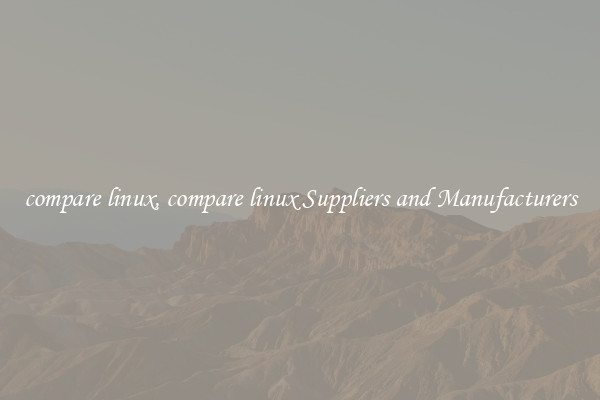compare linux, compare linux Suppliers and Manufacturers
Compare Linux: Comparing Linux Suppliers and Manufacturers

Linux, the open-source operating system, has gained huge popularity in recent years. Its flexibility, security, and cost-effectiveness make it an attractive choice for businesses and individuals alike. Whether you are a small business owner looking for a reliable operating system or a tech enthusiast wanting to experiment with different Linux distributions, it is essential to choose the right Linux supplier or manufacturer. In this article, we will compare various Linux suppliers and manufacturers to help you make an informed decision.
1. Red Hat:
Red Hat, a leading provider of open-source solutions, offers a powerful and enterprise-ready Linux distribution known as Red Hat Enterprise Linux (RHEL). It is known for its strong security features and exceptional technical support. Red Hat also provides comprehensive training programs and certifications for those who want to enhance their Linux skills.
2. Ubuntu:
Ubuntu, developed by Canonical Ltd., is one of the most popular Linux distributions for desktop and server environments. It offers a user-friendly interface, regular updates, and a diverse range of software packages. Ubuntu has a large and active community, providing excellent support and extensive documentation for users.
3. SUSE Linux Enterprise:
SUSE Linux Enterprise is a reliable and scalable Linux distribution aimed at enterprise customers. It offers advanced features like high availability, live kernel patching, and system rollback capabilities. SUSE is known for its strong partnerships with hardware manufacturers and has extensive support options, including long-term support (LTS) releases and subscription-based support.
4. Debian:
Debian is a highly stable and versatile Linux distribution that forms the foundation for many other popular Linux-based operating systems, including Ubuntu. It is governed by a strict set of principles, prioritizing open-source collaboration and community-driven development. Debian focuses on stability and security and offers a wide range of software packages for different use cases.
5. CentOS:
CentOS, a community-driven Linux distribution, is renowned for its compatibility with Red Hat Enterprise Linux. It aims to provide a free and open-source alternative to RHEL, making it a popular choice for businesses and individuals who want the stability and security of RHEL without the associated costs. CentOS offers long-term support and frequent security updates.
When choosing a Linux supplier or manufacturer, it is important to consider factors like your specific needs, technical expertise, support options, and long-term stability. While the aforementioned options are some of the most popular and trusted Linux distributions, there are many other suppliers and manufacturers available in the market. It is advisable to evaluate multiple options and consult with experienced Linux users or IT professionals before making a final decision.
In conclusion, Linux offers a variety of distributions catering to different requirements and preferences. By comparing various Linux suppliers and manufacturers, you can select the one that best aligns with your needs and contributes to the success of your business or personal projects. Make an informed decision and enjoy the numerous benefits that Linux has to offer!

View details

View details

View details

View details








